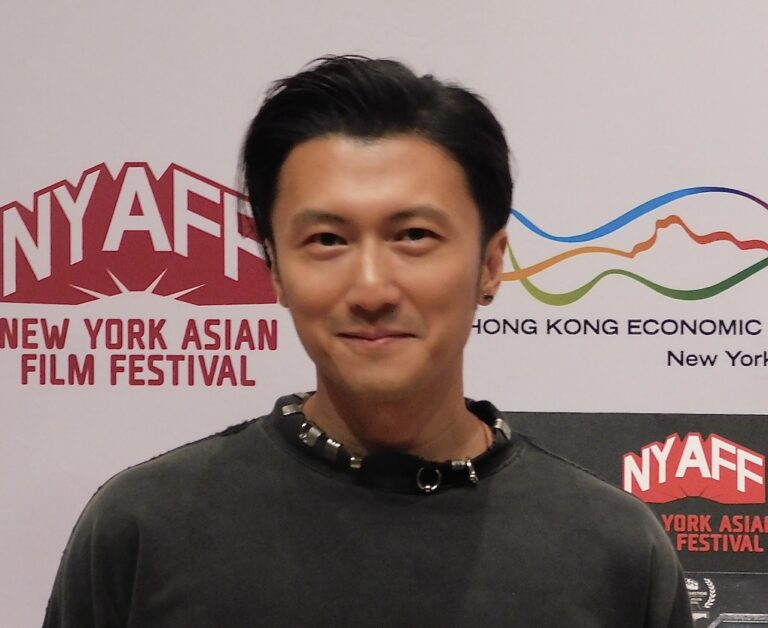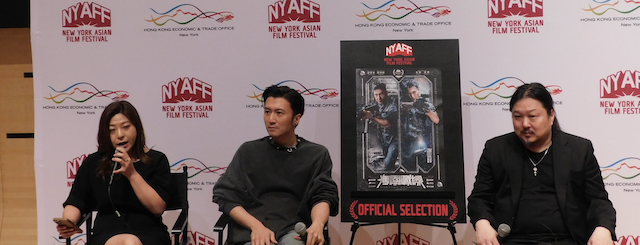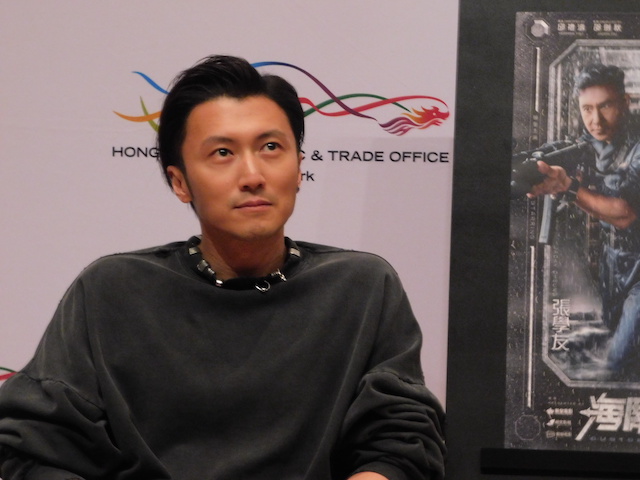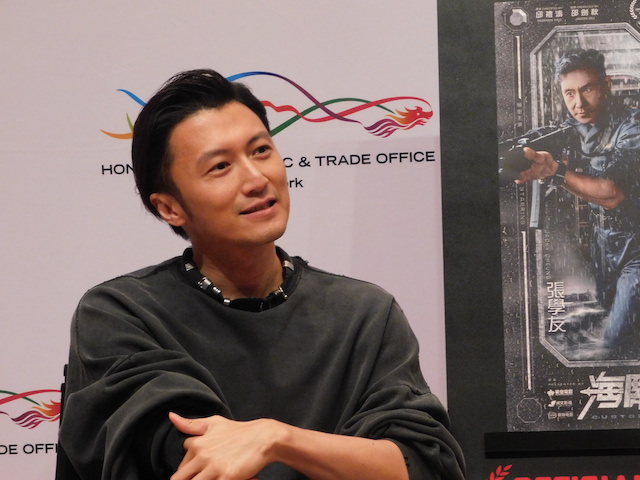
©Photo by Nobuhiro Hosoki

©Photo by Nobuhiro Hosoki
Samuel Jamier: I’m Samuel Jamier, the festival president and director. It’s a pleasure to have this press conference. When we started off the festival over 20 years ago, we were a very scrappy operation. We started off by showing Hong Kong films, as I like to mention, every year. That was really our point of departure, and it’s still part of our DNA.
At the time, we didn’t necessarily have the most obvious amount of credibility or legitimacy, but the Hong Kong Economic and Trade Office was one of the first institutional organization to believe in us and invest in what we’re doing. And here we are today with the film star, Nicholas Tse, also making his debut as an action director.
He is truly a man who needs no introduction, but I will nonetheless leave it in the hands of Maisie Ho, the director of the Hong Kong Economic and Trade Office, thanks to whom our efforts are being showcased. Maisie, would you like to say a few words?
Maisie Ho: Thank you, Samuel. Samuel has been our wonderful partner for the last–I don’t know–decades. So thank you again for making this happen. And I’d just like to say a few words here. Today we’re here to celebrate the incredible talent of Nicholas Tse, our homegrown Hong Kong—not only movie star, but who turned into an entrepreneur who is also very talented across various endeavors. So we’re not only here for Nicholas, but also we’re here for the dynamic spirit of Hong Kong cinema in the heart of New York City.
We of the Hong Kong Economic and Trade Office in New York are the official representative of Hong Kong government in the eastern US. We have been supporting the Hong Kong panorama in the NYAFF since 2009. So we are here to showcase Hong Kong’s cinematic excellence and bring eminent directors, actors, and screenwriters here to the New York stage.
Hong Kong cinema is renowned for its rich diversity. It has impacted the world for decades with the adrenaline-pumping action of films with innovative choreography and compelling storytelling. So this year’s Hong Kong Panorama is no less [exciting]. This year’s Hong Kong Panorama showcases an array of 11 films across various genres.
Highlighting our lineup are two world premieres and four North American premieres, including our very own NYX Custom Frontline, which you will see later this evening. Each of these Hong Kong productions showcase Hong Kong’s cinematic excellence and cultural depth. The Hong Kong Special Administrative Region has been supporting the development of Hong Kong;sfilm industry through various initiatives, including enhancing local film production, nurturing talent and expanding its markets and audience worldwide.
Through the Film Development Fund, for example, we have over the years helped nurture over a hundred films to reach global audiences and achieve acclaim both critically and commercially. But the true hero behind the success of Hong Kong film industry are exemplars like Nick, whose unparalleled dedication and talent have constantly elevated our cinema scene into the global stage.
So for Nick, I know that this movie has been a significant milestone for you, as you’re not only the lead actor but also for the first time the action choreographer and director. So tonight we will all witness how Hong Kong once again has set the standard of what action movies should look like. Last but not least, I’d like to once again extend my heartfelt gratitude to Samuel and the NYAFF team for their tireless efforts in championing Hong Kong cinema onto this global stage. Thank you all for joining us, and thank you Nick for joining us as well, and hopefully we will see each other tonight.
Sam Jamier: Thank you. That’s amazing. Thank you for the kind words. Before we get started, let me turn to Nick. Would you like to say a few words to kick off the Press Conference?
Nicholas Tse: No, it’s just an honor to be here and I’m really glad to have the chance to show Cousins Frontline to New York and the rest of the world.

Photo by Nobuhiro Hosoki
Q: The first question for Nick is about his coming to NYAFF. What does that mean for your career and how do you feel about coming here to represent your film? The second question is, you represent yourself as an action choreographer here, and because Nick has a very successful career also as a chef. Which does he like better, cooking or making films?
Nicholas Tse: Action as a body language has always been a way of exporting it out to the rest of the world, and Hong Kong has relied on that for a long time. An;d so I want to bring back the old school kind of process of bringing real time action and Hong Kong action back to a younger generation of sorts.
As an action director throughout his career he suggested certain things in the past and it wasn’t until this film that he suggested he wanted to have an official title. And as for his decision to choose between all the various things that he does in his career—music, cooking, or filmmaking–all three are just as important because this just expresses his creativity in all different ways.
Q.: Obviously as for this film, you are an action director. When you were directing other actors, like Andy Lau or whoever, how does he choreograph for other people instead of for himself? And because he’s an action choreographer and director, what kind of other roles does he want to do moving forward with the films that he wants to make?
Nicholas Tse: Action films—and also spoken language and body language— to him are pretty similar. They all lead to telling the story based on what the plot is asking for. And in terms of working with other actors. I think a lot of [depends on] how much they’re willing to do for the screen, and how much they are actually comfortable doing, and their levels. And so he choreographs based on their level.
And in terms of what else I currently want to do after being an action director, this is all I’m able to do at the momentbecause this is my focus. I haven’t thought about what else I want to do moving forward.
Q : So you’ve played a lot of characters in the past, and I think this one is new to you (playing a customs officer). How do you like it, and also are there other characters you would like to play?
Nicholas Tse: I’m open to any characters or any roles, I don’t know. But with this one, I think it’s very special because Hong Kong is actually a little island. We’re surrounded by the ocean, but no one’s ever really made the effort to shoot such a scene. Because it’s so difficult on the waters you can prepare for one month, but when the weather is bad, then you’re pretty much messed up.
It was a big challenge, but that was also what I felt was really unique about the film. So we took on this challenge.
Q.: Can you talk about how you balance the job of being the leading actor and also the action director?
Nicholas Tse: Yeah, this was a tougher one because of the elements. Sometimes I may be fighting over a [shipping] container that’s seven stories in the air, or I may be underwater. So it was hard for me. When we cut, I couldn’t really watch the playback. I couldn’t adjust as I would want to.
Apart from that situation, everything was pretty much normal. And I guess one thing that was really hard was—I do all my actions, right? So when you put yourself at risk or danger, that’s one thing, but when you ask someone else to do it, it’s really outdated.
Q : I’m curious to know, you have been directing for a little while now. I’m just curious; are you gonna explore some of these projects outside mainland China or Hong Kong?
Nicholas Tse: Definitely if the chance occurs I think, and of course I’m quite picky with roles, so if the opportunity is there definitely, yeah.
Q : You have been a very famous person for almost your entire life. What inspiration do you get from your seemingly repetitive dual celebrity life? What elements do you take from life to feed your creation, your creative process?
Nicholas Tse: Now I’m a father, now I have more experience in life, so all these emotions are quadrupled. It’s just so different than when I was a teenager. So I guess this is a statement of creativity: it’s telling the story of different stages of life.

Photo by Nobuhiro Hosoki
Q : The question is about the upcoming new police story. Are there any updates that you can tell me?
Nicholas Tse: Not ready yet. They are still in production.
Q: Is there one character that you would like to play that you haven’t played yet?
Nicholas Tse: I don’t know. Not specifically. I’m very open to all different imaginations.
Q : And do you have any plans for this trip?
Nicholas Tse: No, I think the schedule is pretty packed. I’d love to leave, eat around New York, but I haven’t had the chance yet.
Q: I’m curious to know you’ve been working from the 90s and how much it has changed when you started off in Hong Kong, now in mainland China. Is there any film that has become like a turning point of your life.
Nicholas Tse: I wouldn’t say that one specific film was a turning point, but I think it accumulated through the first ten years when the action movie scene was really blooming in Hong Kong. I think that made a true statement around the globe actually. And I think that’s really what I’m trying to revive.
It is our ability to make action movies without too much sort of computer graphics. I think that’s a true essence. And I still believe up until today that if the actor can pull it off, it’s still much more superior than CG [computer generated]. Maybe in ten years when CG is really efficient and a lot cheaper and AI is so advanced that we don’t have to But for now, we don’t have the budget—we’re not Iron Man.
And I still think, especially with hand-to-hand combat, that Hong Kong actually has its identity.
Q: What’s the best way to bring in the next generation of actors who could come in and want to be the next action hero?
Nicholas Tse: To be honest, make movies that are good. If there’s a lot more of them, and the younger generation is able to fall in love with these actors on screen growing up, I would like it. People like Jackie (Chan) were the inspiration for me to want to get into the action in the first place.
Q: You mentioned that it will be the kind of role you will get in the future that [will determine] if you still want to take more acting roles. So I’m just wondering, do you still want to do more production roles, like how you did with this movie? And also do you still want to keep the acting roles? And if that is still the path, what kind of roles are you specifically looking for?
Nicholas Tse: After I finished Customs for Frontline, I also did this one called Raging Havoc, which is maybe the part two of Raging Fire with Mr. Andy Lau. And he was also the action director. I think for some upcoming movies, I’ll be participating in the action a little bit more, because I think—now that I also have built my own team to do my action scenes—it’s just safer this way. And I think in order to really reintroduce or promote the so-called action scene, I think I’ll have to take this up myself.
Q.: As someone who has this monumental status, what’s your expectation for the future of the entire Hong Kong film industry? To the average New Yorker, Hong Kong movie is viewed through a very problematic lens of the Wong Kar-wai or action movie. What’s your expectation of maybe a newer genre or a newer kind of film? And what’s your role in shaping the future of Hong Kong [cinema]?
Nicholas Tse: That’s a very big question that I can’t really answer. I can only say that what we’re trying to contribute in the present is the reintroduction [of such action films]. And by showcasing that Hong Kong action has its own purpose and difference in movie making. And that this action has been catered for us and been really modified through maybe 30, 40 years. And of course there are different ways doing action movies, but I think this is the one that suits us the most and has its own identity in the whole world.
Q: The question is for Chef Nick. Would he want to bring some of the things that he’s releasing as a chef to the West? And doesn’t a lot of it have to do with import-export kinds of regulations.
Nicholas Tse: I would love to bring the things that I’m doing really well with back home to us and let us appreciate the kind of awesome food that I’m working on. Thank you.
Q: When you started off, you had tough competitors such as Donnie Yen, Jet Li, of course Jackie Chan and all that. What are the key elements that you use to survive as an actor? What are the things that made you become who you are?
Nicholas Tse: That’s a good question. I guess it’s perseverance or the true love for your work. Especially for the young generation–they really don’t understand. Or they might not have the time yet to be able to dedicate their lives, so many years of their lives, to one craft.
So I’ve been in the business for 25 years already, and I’m still at it. That’s the only way to find out—grinding every day, back and forth, every day, and trying to make it better and better, and once you think you’ve succeeded, you just keep going. You go back to the drawing board and you keep grinding again. I don’t think anybody can escape from that fate of just practicing and practicing.
Samuel Jamier : Thank you. I believe this is probably a very good way of closing today’s press conference.
If you like this interview article, share your thoughts below!
Check out more of Nobuhiro’s articles.
Here’s the trailer of the film.

